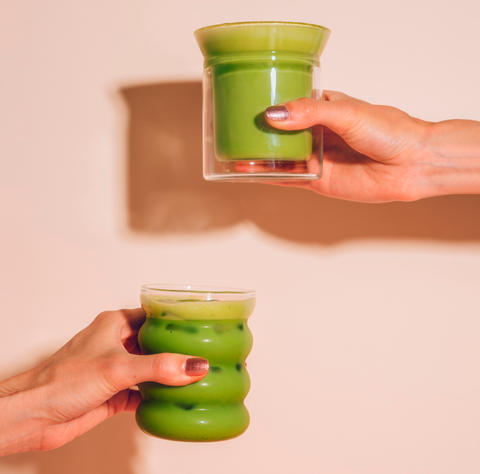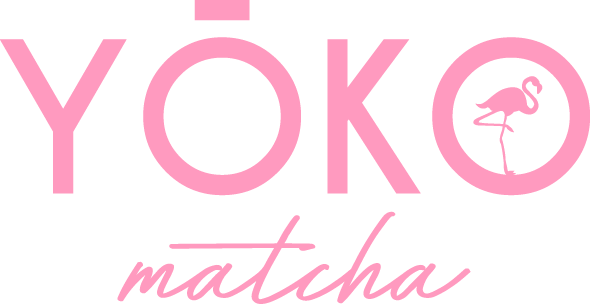Pregnancy is a special time in a woman's life, marked by numerous changes and considerations in her daily routine, including her diet.
As expectant mothers, we strive to make the best choices for our growing babies, and one of the areas of concern is caffeine intake.
While many caffeinated beverages are off-limits during pregnancy, matcha tea stands out as a unique option that offers both benefits and potential risks.
In this comprehensive guide, we'll explore the world of matcha during pregnancy, shedding light on its advantages, potential drawbacks, and how to enjoy it safely.
Benefits of Matcha When Pregnant
1. Nutrient Powerhouse
Matcha tea, often hailed as a nutritional powerhouse, is packed with essential vitamins and minerals. During pregnancy, your body has increased nutrient requirements, making matcha a potential ally in meeting these needs.
This vibrant matcha green tea is known to be a rich source of vitamins A, C, and K, as well as minerals like potassium and magnesium.
These nutrients play vital roles in the development of your baby's organs and overall health.
2. Antioxidant Protection

One of the standout features of matcha is its exceptionally high antioxidant content. The tea is loaded with catechins, particularly epigallocatechin gallate (EGCG), which has powerful antioxidant properties.
Antioxidants help protect your cells from damage caused by free radicals, which is especially important during pregnancy when your body is working hard to support the growth and development of your baby.
3. L-Theanine for Stress Relief

Pregnancy often brings with it heightened stress levels. The unique combination of caffeine and L-theanine in matcha can help soothe your nerves without the jitters associated with coffee.
L-theanine is an amino acid known for its calming effects, which can be particularly beneficial when you're dealing with the emotional and physical challenges of pregnancy.
4. Improved Metabolism

Matcha may also assist in maintaining a healthy metabolism during pregnancy. The presence of catechins in matcha has been linked to enhanced metabolism and fat oxidation.
While pregnancy is not the time for weight loss, supporting a healthy metabolism can contribute to better overall health.
5. Immune Boost
A robust immune system is crucial during pregnancy to protect both you and your baby. The antioxidants in matcha can help bolster your immunity, reducing the risk of infections and illnesses that could potentially harm your pregnancy.
Is Matcha Safe for Pregnant Women?
While matcha offers numerous potential benefits during pregnancy, it's essential to consider its caffeine content and other associated risks.
Potential Risks and Precautions
1. Caffeine Content
One of the primary concerns surrounding matcha and pregnancy is its caffeine content. Matcha contains caffeine, though in lower quantities compared to coffee.
However, caffeine intake during pregnancy should be moderated, as excessive caffeine consumption has been linked to complications such as preterm birth and low birth weight.
How much caffeine does matcha tea have?
The caffeine content in matcha can vary depending on factors like the brand and preparation method. On average, an 8-ounce cup of matcha tea contains approximately 30-50 milligrams of caffeine.
To put this in perspective, a standard 8-ounce cup of coffee typically contains 95 milligrams of caffeine. While matcha has less caffeine, it's still crucial to monitor your overall caffeine intake during pregnancy.
What should I do if I'm concerned my caffeine intake is hurting my newborn?

If you're concerned about your caffeine intake affecting your baby, it's wise to consult with your healthcare provider.
They can provide personalized guidance based on your specific circumstances and preferences. In some cases, they may recommend reducing your caffeine intake or switching to caffeine-free alternatives.
2. Hormonal Changes
Pregnancy is characterized by significant hormonal fluctuations, which can sometimes lead to skin issues like acne. Some individuals wonder if matcha can help clear up hormonal acne during pregnancy or postpartum.
While matcha's antioxidants and anti-inflammatory properties may contribute to healthier skin, its impact on hormonal acne can vary from person to person.
It's essential to consult with a dermatologist or healthcare provider for a tailored skincare regimen during pregnancy.
Matcha Powder, Lattes, and Other Products During Pregnancy

Matcha comes in various forms, from traditional powder to lattes and even skincare products. Let's explore the safety and benefits of these different options during pregnancy.
What makes matcha caffeine safer for pregnancy than coffee?
The key to matcha's milder caffeine impact lies in its unique composition.
Matcha contains both caffeine and L-theanine, which work in tandem to provide alertness without the excessive stimulation or jitteriness associated with coffee.
L-theanine helps balance the stimulating effects of caffeine, making matcha a smoother and potentially safer choice for pregnant women.
Tips for Drinking Matcha During Pregnancy and Breastfeeding
-
Stay Hydrated: Matcha, like other caffeinated beverages, can have a diuretic effect, so be sure to drink plenty of water to stay well-hydrated.
-
Monitor Your Baby: Pay attention to your baby's behavior and sleep patterns. If you notice any changes that could be linked to caffeine intake, consider adjusting your matcha consumption accordingly.
-
High-Quality Matcha: Choose high-quality matcha from reputable sources to ensure you're getting the best nutritional value with minimal contaminants.
-
Limit Added Sugars: If you prefer matcha lattes, opt for natural sweeteners like honey or maple syrup to control your sugar intake.
-
Listen to Your Body: Just as during pregnancy, pay attention to how your body reacts to matcha while breastfeeding. If you experience any adverse effects, it may be best to reduce or eliminate your consumption.
Can matcha help clear up stretch marks from pregnancy?

Matcha's antioxidants and anti-inflammatory properties may contribute to healthier skin. These properties can potentially assist in reducing the redness and inflammation associated with stretch marks.
However, it's essential to manage your expectations; matcha alone may not completely eliminate stretch marks, but it can be a part of a holistic skincare routine.
To address stretch marks effectively:
-
Stay Hydrated: Proper hydration is essential for maintaining skin elasticity.
-
Moisturize: Use a good-quality moisturizer or oil on your skin to help keep it supple. Cocoa butter, shea butter, and oils like coconut or almond oil are popular choices.
-
Gentle Exfoliation: Gentle exfoliation can help remove dead skin cells and promote skin renewal. Be cautious when exfoliating during pregnancy or breastfeeding and choose gentle exfoliants.
-
Healthy Diet: A balanced diet rich in vitamins and minerals can contribute to skin health. Matcha can be a part of this diet, but it should not replace a well-rounded nutrition plan.
-
Consult a Dermatologist: If you're concerned about your stretch marks, consult a dermatologist for professional advice and potential treatments.
Can drinking matcha help with morning sickness?

Matcha's combination of caffeine and L-theanine may offer some relief from morning sickness symptoms.
The calming effect of L-theanine might help soothe nausea, while the moderate caffeine content could provide a mild energy boost.
However, it's important to approach this with caution:
-
Moderation: Consume matcha in moderation to avoid excessive caffeine intake, which can exacerbate nausea.
-
Experiment: Test how your body reacts to matcha when experiencing morning sickness. If it worsens your symptoms, it's best to avoid it.
-
Alternative Remedies: There are various other natural remedies for morning sickness, including ginger tea, acupressure wristbands, and small, frequent meals. Consult your healthcare provider for personalized recommendations.
What is the Best Matcha to Have While Pregnant or Breastfeeding?
When choosing matcha during pregnancy and breastfeeding, quality matters. High-quality matcha ensures that you're getting the most nutritional benefits with minimal contaminants. Here are some tips for selecting the best matcha:
-
Choose Ceremonial Grade: Organic Ceremonial grade matcha is the highest quality and is produced from the youngest tea leaves. It tends to have a smoother flavor and is less likely to contain impurities.
-
Look for Organic: Organic matcha is produced without synthetic pesticides or fertilizers, making it a safer choice during pregnancy and breastfeeding.
-
Check the Source: Be mindful of where your matcha comes from. Matcha from reputable sources, such as Japan, is typically of higher quality and has stricter safety standards.
-
Read Reviews: Research and read reviews to find a matcha brand that is well-regarded for its taste and quality.
The Bottom Line - Matcha is Beneficial for Pregnant and Postpartum Moms

In conclusion, matcha can be a valuable addition to the diets of pregnant and breastfeeding mothers when consumed in moderation and with awareness of its caffeine content.
It offers a range of potential benefits, including a nutrient boost, antioxidant protection, stress relief, and skin health.
However, it's crucial to approach matcha consumption during pregnancy and breastfeeding with caution and follow some general guidelines:
-
Limit your daily matcha intake to one to two cups.
-
Be aware of your overall caffeine consumption from various sources.
-
Choose high-quality, organic ceremonial matcha from reputable sources.
-
Avoid sugary additives and opt for natural sweeteners if desired.
-
Monitor your body's response to matcha and adjust your consumption accordingly.
While matcha can be a nutritious and enjoyable part of your daily routine, always consult with your healthcare provider for personalized advice on your diet and lifestyle during pregnancy and breastfeeding. They can provide guidance tailored to your specific needs and circumstances.
Remember that every pregnancy is unique, and what works for one person may not be suitable for another.
It's essential to prioritize your health and the health of your baby by making informed choices and seeking professional guidance when needed.
With the right approach, you can savor the benefits of matcha while navigating the incredible journey of motherhood.





